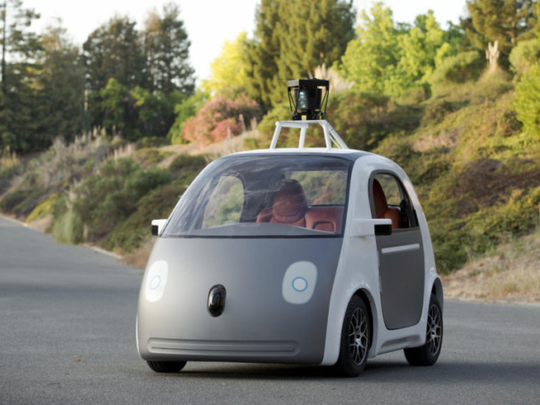
Geneva: Automotive executives are taking seriously the prospect that Apple and Google will emerge as competitors even as they consider partnering with the two.
“If these two companies intend to solely produce electric vehicles, it could go fast,” Volkswagen CEO Martin Winterkorn said. “We are also very interested in the technologies of Google and Apple, and I think that we, as the Volkswagen company, can bring together the digital and mobile world.”
Apple has been working on an electric auto and is pushing to begin production as early as 2020, people with knowledge of the matter said last month. Google said in January it aims to have a self-driving car on the road within five years.
The time frame — automakers typically need at least five years to develop a car — underscores the aggressive goals of the two technology companies and could set the stage for a battle for customers. The market for connected cars may surge to €170 billion (Dh690 billion, $190 billion) by 2020 from €30 billion now, according to a German government policy paper obtained by Bloomberg News.
“The competition certainly needs to be taken seriously,” said Stefan Bratzel, director of the Centre of Automotive Management at the University of Applied Sciences in Bergisch Gladbach, Germany. “The closer we get to autonomous driving, the weaker the connection becomes between the customer and the car. And Google and Apple aren’t burdened with old technology but can start fresh.”
Tesla Motors Inc’s success in creating a start-up car company has also shown that the traditional barriers of entry into the auto industry aren’t as difficult to overcome as some thought. Tesla and General Motors are both targeting a 2017 release of an electric vehicle that can go more than 322 kilometres on a single charge and cost less than $40,000.
At the same time, automakers have struggled to bring technical leaps to car development, something that Silicon Valley is also seeking to accomplish. For example, Google has invested in developing an autonomous vehicle since 2010.
“It’s exactly what this industry needed: a disruptive interloper,” said Sergio Marchionne, CEO of Fiat Chrysler Automobiles. “It’s a good thing but when you are one of the guys whose life is being disrupted then you are not necessarily looking forward to the event.”
Chancellor Angela Merkel’s governing party is seeking to help German carmakers and technology companies better compete with Silicon Valley. Merkel’s bloc is working on legislation to advance the move toward driverless cars, according to a policy paper. The goal is to present a plan before the Frankfurt auto show in September.
Regulatory approval
“We never underestimate any competition,” said Ian Robertson, BMW’s sales chief. “The entry barriers, which were in the past maybe more substantial, are now slightly lower. But at the same time, the complexities of the car industry are still there as well.”
An experienced automaker typically spends five to seven years developing a new vehicle from scratch, with just the testing phase needed to get regulatory approval often taking three years. Analysts estimate for a company from outside the industry to build a car could take a decade.
Apple, which posted record profit of $18 billion during the past quarter, in any case has the funds to do it. The company has $178 billion in cash and CEO Tim Cook has been pushing the iPhone maker to enter new market segments to further envelop users’ digital lives with Apple’s products and services.
“The traditional thinking in the automotive industry isn’t suited to exploit the opportunities in the internet community,” Wolfgang Ziebart, Jaguar Land Rover’s head of engineering, said. “If you need committees and so on to make decisions, then you’ve lost before you started.”
Apple’s foray into cars follows a path it’s taken to break into other industries. The company wasn’t the first to make a digital-music player or smartphone, and only entered those markets once it had a compelling product. Google says it’s seeking partners to help realise co-founder Sergey Brin’s vision of safer and more efficient mobility.
And while car manufacturers see Google and Apple as potential competitors, they also view them as partners to advance their own technology. A number of automakers last year signed on for Google’s Open Automotive Alliance to bring the Android operating platform to cars.
“The key element is to make sure that when we’re working with them — and we’re totally open to work with any of them — it’s a real win-win,” said Didier Leroy, Toyota Motor Corp’s European chief. “The carmakers don’t want just to become a kind of commodity, where somebody will only deliver an empty box and somebody will put in the box something which will be the real added value.”










